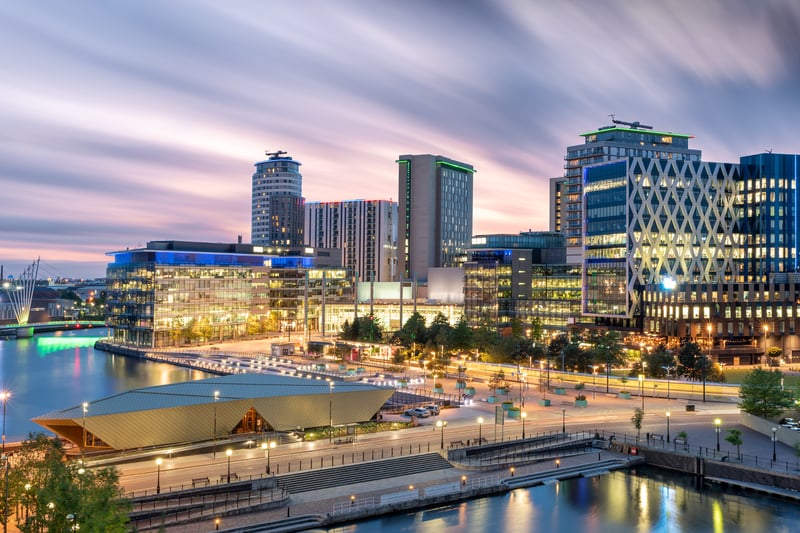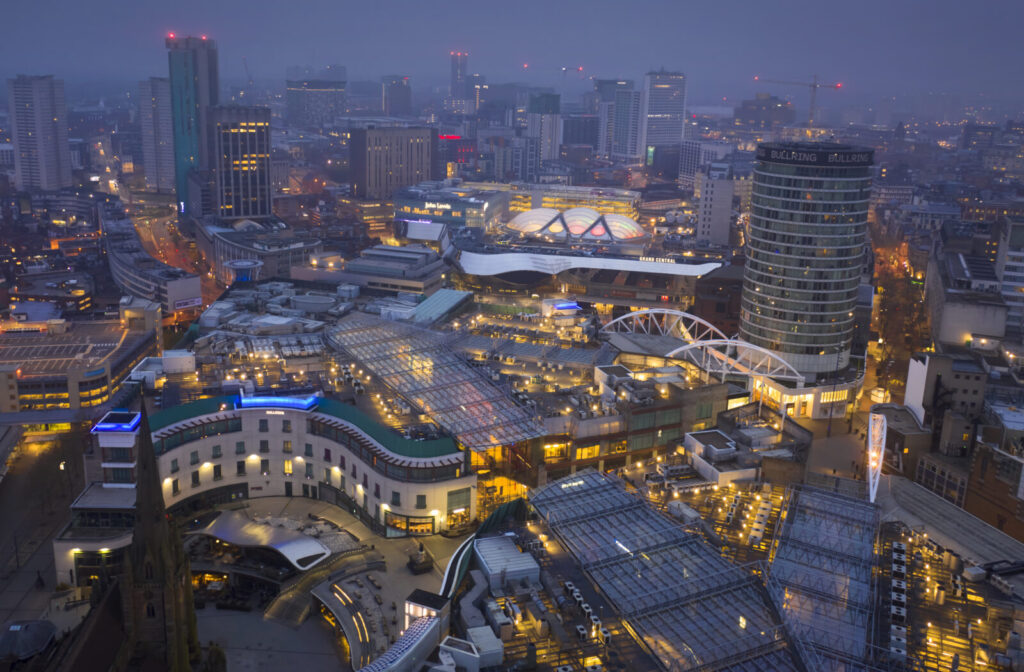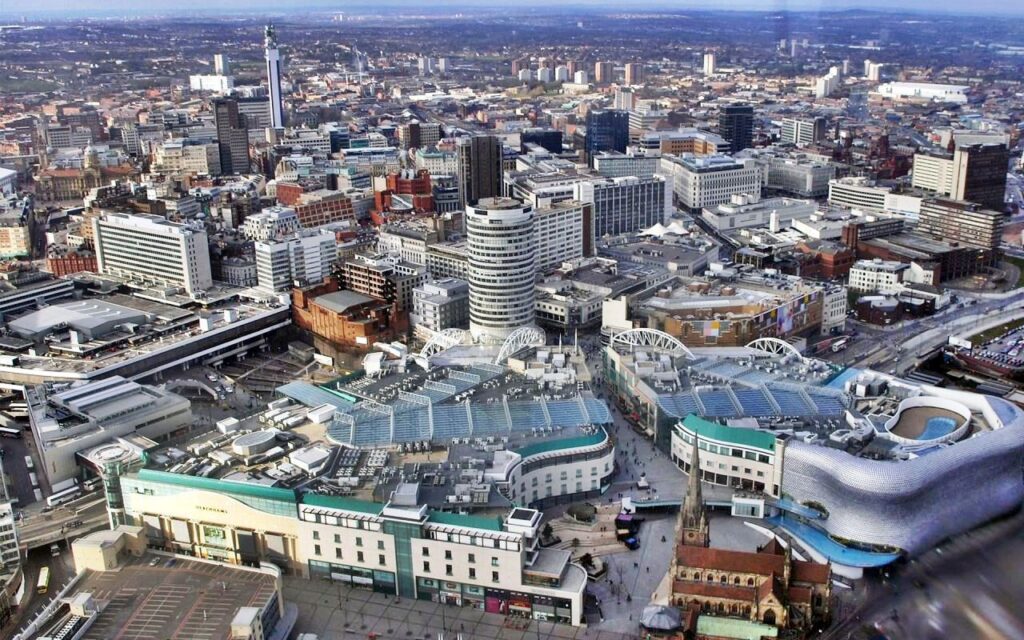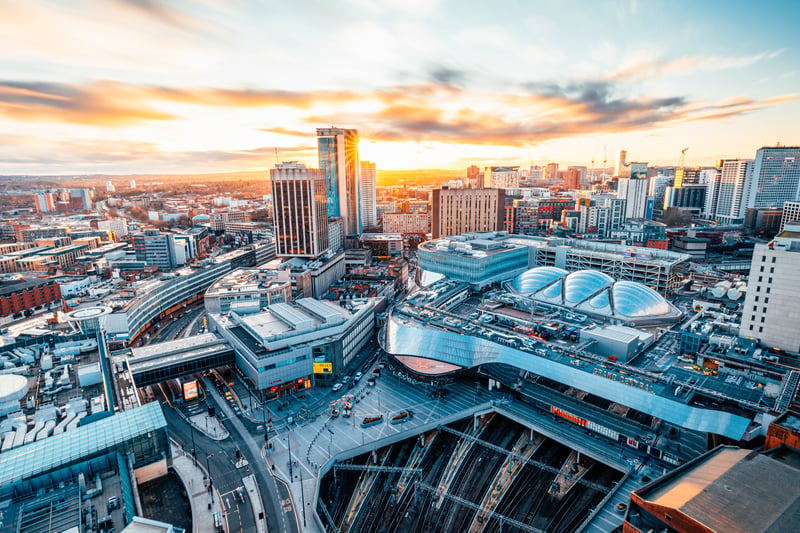Yes, Birmingham, UK, is considered a big city. With a population of over 1 million people, it ranks as the second-most populous city in the United Kingdom, after London. Birmingham’s status as a big city is also supported by its extensive urban area, covering around 103 square miles.
Famous places like the Birmingham Museum and Art Gallery, Bullring shopping center, and the iconic Selfridges building help show that Birmingham is a big city.
Additionally, Birmingham has a variety of jobs, such as manufacturing, finance, and services, which makes its economy strong and diverse.
Overall, its size, population, landmarks, and economic activity affirm Birmingham’s classification as a big city.
The population of Birmingham, UK

As of the latest census conducted on 21st March 2021, the population of Birmingham, UK, stands at approximately 1,144,900. This figure reflects a 6.7% increase from the population recorded in the previous census in 2011, which was around 1,073,000.
Context and Comparison
Birmingham vs. England and Wales
Birmingham’s population growth rate of 6.7% surpasses the overall increase for England (6.6%), where the population grew by nearly 3.5 million to 56,489,800.
Nearby areas, such as Sandwell and Bromsgrove, have also experienced population growth, with increases of around 11.0% and 5.9%, respectively.
Solihull saw an increase of 4.6%, while Dudley’s growth was 3.4%.
Birmingham vs. Other Cities in the UK
Birmingham is the second-largest city in the United Kingdom, with London being the largest.
In terms of total population, Birmingham ranks first among the 309 local authority areas in England, maintaining the same position it held a decade ago.
Tower Hamlets saw the largest percentage growth in population in England, increasing by 22.1% between 2011 and 2021, followed by Dartford with a growth rate of 20.0%.
Historical Trends
Birmingham has a rich history of population fluctuations. Between 1911 and 1921, the city’s population almost doubled, growing from 525,833 to 919,333.
The milestone of exceeding one million residents was first reached in 1931 (1,002,603), followed by a fall to 995,039 in 1939.
Birmingham bounced back to 1.1 million residents in 1951 but declined to 977,087 by the time of the 2001 census.
Ethnic Diversity and Religion
Birmingham is even more ethnically diverse than London. In the 2001 census, the breakdown was as follows
| Ethnic Group | Percentage |
| White | 70.4% |
| Asian | 19.5% |
| Black | 6.1% |
| Chinese | 0.5% |
| Mixed race | 2.5% |
| Other ethnic groups | 0.6% |
The city also has the UK’s highest Gypsy and Traveller population.
Christianity remains the most prominent religion, followed by Islam, Sikhism, and Hinduism
What famous places make Birmingham a big city?

Birmingham is a big city with lots of famous places that make it even more important. Here are some of these special places that help make Birmingham a major city.
Birmingham Museum and Art Gallery: This renowned cultural institution houses an extensive collection of art, artifacts, and exhibitions, showcasing Birmingham’s rich history and artistic heritage.
Bullring Shopping Centre: The Bullring is a huge shopping place in the UK. It has many shops, places to eat, and fun things to do, which bring people from all over the country to visit.
The iconic Selfridges Building: The Selfridges Building in the Bullring is a really cool-looking building. Its futuristic design stands out and shows how modern and innovative Birmingham is.
Cadbury World: Cadbury World, found in Bournville, lets you dive into the yummy world of chocolate. It celebrates Birmingham’s long history with the famous Cadbury chocolate brand.
Edgbaston Cricket Ground: Edgbaston is a top cricket spot in the UK. It hosts big cricket games and tournaments, bringing cricket fans from all over the world to watch.
The NEC (National Exhibition Centre): The NEC, near Birmingham Airport, is the biggest exhibition center in the UK. It holds lots of trade shows, concerts, and events, showing how Birmingham is a hub for both business and fun.
The Birmingham Botanical Gardens: This peaceful place in the middle of the city has beautiful gardens, greenhouses, and plants on display. It’s like a quiet getaway from the busy city life.
How does Birmingham’s economy compare to other UK cities?

Let’s explore how Birmingham’s economy compares to other cities in the United Kingdom.
Gross Value Added (GVA)
Birmingham’s GVA (a measure of economic output) is comparable to its size within the group of cities.
However, when considering GVA per worker, which reflects productivity, Birmingham ranks 263rd out of 330 cities.
This suggests that while Birmingham has a significant economic output due to its size, its productivity per worker is relatively low.
Industrial Structure
Birmingham shares similarities with several European cities in terms of its industrial structure.
These cities have diverse economies, including a mix of manufacturing, high-value business services, and a substantial public sector. Some comparable European cities include Lille and Athens.
Productivity and Skills
Birmingham’s GVA per worker indicates that productivity levels need improvement.
The proportion of Birmingham’s population classified as “high skilled” is relatively low. The city has a significant number of low-skilled workers.
Patent Applications
Birmingham’s performance in terms of patent applications (an indicator of innovation and research) is not strong.
This suggests that the city may need to focus more on fostering innovation and knowledge-based industries.
Unemployment
On a positive note, Birmingham has low unemployment rates. However, this may be linked to the trade-off between employment and productivity.
FAQ
Is Birmingham city bigger than Manchester?
Yes, Birmingham is the second most populous city in the UK, with a population of over 2.5 million, while Manchester has around 2.4 million people.
Is Birmingham UK a good place to live?
Yes, Birmingham is a great place to live. Birmingham has a lively culture, great universities, growing technology jobs, and an international airport. It’s cheaper than London, so it’s a good place for both students and professionals to live.
Are people in Birmingham friendly?
Yes, people in Birmingham are really friendly and welcoming. There are lots of different kinds of people, which makes the city feel cozy and welcoming. You’ll have lots of chances to meet new friends and be part of the fun community.
Is Birmingham bigger than Bristol?
Yes, Birmingham is larger than Bristol. Birmingham has a population of around 2.6 million, while Bristol’s population is approximately 753,700.
Is Birmingham a student city?
Yes, Birmingham is a city with lots of students. Birmingham has five universities, like the University of Birmingham and Birmingham City University. It’s a great place for students because there’s lots to do and learn.
Final thoughts
Birmingham, UK, is a big city. It has lots of people, different kinds of jobs, famous places, and a lively culture. From busy shopping areas to old landmarks, Birmingham has everything you’d find in a big city.
Whether you’re visiting museums, watching cricket, or just relaxing in the parks, Birmingham has all the things you expect from a big city.



